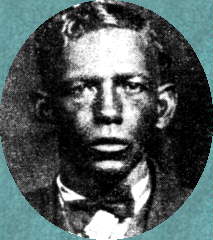

Charley Patton
"The Father of The Delta Blues"
April 1891 - April 28, 1934
Birthplace: Indianola, Mississippi
Charley Patton was the
first great Delta bluesman; from him flowed nearly all the elements that would comprise
the region's blues style. Patton had a coarse, earthy voice that reflected hard
times and hard living. His guitar style percussive and raw-matched his vocal delivery. He
often played slide guitar and gave that style a position of prominence in Delta blues.
Patton' s songs were filled with lyrics that dealt with more than mere narratives of love
gone bad. Patton often injected a personal viewpoint into his music and explored issues
like social mobility ("Pony Blues"), imprisonment ("High Sheriff
Blues"), nature ("High Water Everywhere"), and mortality ("Oh
Death") that went far beyond traditional male-female relationship themes.
Finally, Patton defined the life of a bluesman. He drank and smoked excessively. He
reportedly had a total of eight wives. He was jailed at least once. He traveled
extensively, never staying in one place for too long. He was superstitious and flirted
with religion. He was cocky and often belligerent.
Patton's standing in blues history is immense; no country blues artist
save Blind Lemon Jefferson exerted more influence on the future of the form or on its
succeeding generation of stylists than Patton. Everyone from Son House, Howlin'
Wolf, Tommy Johnson, and Robert Johnson to Muddy Waters, John Lee Hooker, and Elmore James
can trace their blues styles back to Patton.
In a sense, Charley Patton, in addition to being a bluesman of the highest
caliber, might also have been the first rock & roller. Patton was far from
passive when he performed in front of an audience. It was not uncommon for him to play the
guitar between his knees or behind his back. He also played the instrument loud and rough.
Patton jumped around and used the back of his guitar like a drum. He was a showman who
made histrionics a part of the music. One can begin with Patton's protorock roots
and see them extend through Howlin' Wolf, then into Little Richard and James Brown, and
finally into Jimi Hendrix.
Little is known of Patton's early life. Some blues historians believe he was born in 1881;
most likely he was born in 1891. When he was a child, his family moved from the
Mississippi hill country to the Delta to work on the Dockery plantation. Here he came into
contact with Henry Sloan, one of the earliest of the Delta bluesmen. Unfortunately, Sloan
nor any of the Dockery plantation blues pioneers had the opportunity to record. But it is
safe to assume that what eventually became Patton's blues style was shaped by what he
heard these men play just after the turn of the century.
By 1915 or so Patton was well on his way to becoming one of the Delta's most popular
bluesmen. He played picnics, parties, one-room juke joints, and levee camps, often with
fellow guitarist and friend Willie Brown. He hoboed around, gaining fame for his sharply
delivered blues and his feisty personality. Patton finally got his chance to record in
1929 after he auditioned for Henry Speir, a white Jackson, Mississippi, music store owner.
Speir contacted Paramount Records and set up a recording session for Patton in Richmond,
Indiana. One of the first songs he recorded, "Pony Blues," became his first
issued recording. It sold well, especially in the Delta region, and ultimately became a
Patton trade- mark tune. In all, Patton recorded fourteen sides in Indiana before
returning to Mississippi. Patton's second recording session took place in Grafton,
Wisconsin, at Paramount's home studio. Delta fiddler Henry "Son" Sims
accompanied him on fiddle. The following year, 1930, Paramount issued thirteen Patton
records, and Patton became a certified country blues star. He often performed with Son
House, one of the guitarists who would take Patton's place in the Delta blues hierarchy
after Patton's death four years later. Patton took House, along with Willie Brown and
blues pianist Louise Johnson, with him to Grafton for his third recording session in
mid-1930.
There would be one more recording session for Patton before he died. In early 1934,
despite failing health, Patton and his wife, Bertha Lee, traveled to New York City to
record for the American Record Company. This session is generally judged by blues
historians to be his least fruitful, though one of the songs he cut, "Oh Death,"
was tragically prophetic. After the sessions, Patton and Bertha Lee returned to
Mississippi. Just a few months later, Patton died of a heart condition. He was forty-three
years old. Patton was inducted into the Blues Foundation's Hall of Fame in 1980.
"Revenue Man Blues" is from Legends of the Blues - Volume 1 Copyright ©
Sony Music Entertainment Inc., 1991. Accompanied by own guitar, Charlie originally cut
this song in New York City on January 31, 1934.